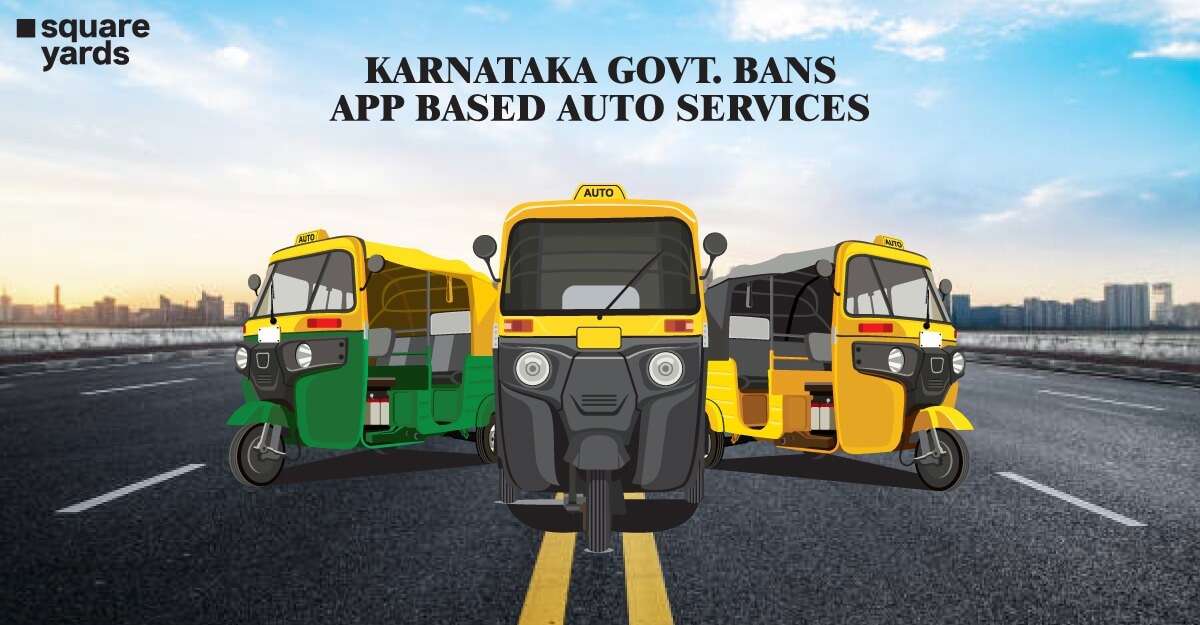The Karnataka government has mandated app-based taxi companies to cease operating auto-rickshaw services in the state in less than three days following a significant outcry over high prices.
The Karnataka government ruled that the auto services provided by app-based cab aggregators like Ola, Uber, and Rapido are illegal after commuters complained that they were being charged up to Rs 100 for just a 2 km distance. This fare is significantly higher than what is set by the state’s transportation authority. The Karnataka taxi aggregators must turn off their auto services on the apps within three days.
Auto drivers have been permitted to charge a fixed fare of Rs 30 to cover the initial 2 km and, after that, charge additional Rs 15 per km by government regulations. The transport department has requested information from these businesses regarding the auto-rickshaw services they provide and the fare charged by them.
Auto services must be discontinued and not begin charging commuters exceeding the cost stipulated by the authorities, stated the notice from the Karnataka State Transport Department. The department has provided the companies, and 3 days to submit the compliance reports.
As per media reports, the department had also declared that the auto facilities provided by the aggregators were “illegal” under the on-demand transportation technology act of 2016. Karnataka’s local police stated that cab service-providing companies are not permitted to operate auto services because the regulations only apply to taxis.
In accordance with the stated order by the government, only taxi services defined as motor vehicles with a maximum seating capacity of six people, excluding the driver, may be rendered as per the contract.
According to reports, the auto aggregators increased the base price directly into the drivers’ pockets, about Rs 30 to Rs 60. Following a barrage of grievances, a report stated, citing unnamed official sources, that the prices had been reduced to the old fare.
The app-cab service providers increased prices partly to reimburse can and auto drivers for the increasing fuel costs. It was reported in the media this year that taxi drivers were unwilling to turn on the cab’s AC to save on fuel prices and charging extra to travellers in case they insisted on turning on the AC of the cab.
The cab drivers, who have resumed work after the covid pandemic that lasted two years, claim that they have been struggling financially and that giving commission to companies like Ola, Uber and Rapido or any app based taxi service lowers their earnings by a huge percentage.
Ola as well as Uber are quite popular and control the Indian market for on-demand cab services. These companies have regularly been on the government’s radar due to their fare structure.
Industry executives stated that they would contact the transport authority of the state of Karnataka and ask them to reconsider their order for such app based cab services.
An Ola source claims that business will continue as usual for the ride-hailing unicorn. However, the organisation has formally declined to speak about the current problem.
As of 2016, the aggregators have always had disagreements with the state authority, the most recent of which occurred in March 2019. The services provided by the aggregators have previously been referred to as “illegal”.
see also – Ban on Firecrackers in Delhi – Say Yes to a Green Diwali
A Rapido representative commented on the development and said, “In response to the letter that the Commissioner of Road Transport and Safety of the Transport Department of Karnataka sent to auto-rickshaw service aggregators, Rapido would like to make it clear that none of its activities in Bengaluru are unlawful.
The Road Transport Authority has sent Rapido a notice, and they are yet to respond to it, however they claimed to do it as soon as possible. “The assertions made regarding the additional charges made by Rapido auto fares are totally false. Rapido does not impose any additional fees on top of the fares set by the state government, which are used to determine all of our fares”, added the representative of Rapido.
The spokesperson also said, “Rapido will continue to run their business legally in Bengaluru. Any unfounded accusations made against Rapido auto services in Bengaluru are not just unreasonable but also dehumanizing because they endanger the livelihood security of the captains who drive the autos under Rapido.”
“They depend on Rapido for their daily wages and making daily commute easy for thousands of state residents. By giving the residents of Bengaluru a safe, practical, and affordable commute, Rapido intend to continue serving them with their auto and cab services.” added the representative of Rapido.
Ola, Uber, and other app-based taxi services use GPS to estimate fares for passengers based on the trip’s duration and distance to the destination as displayed on Google Maps. Due to the inaccuracies in the digital distance mapping, this may result in higher rates than usual. The use of digital metres has been suggested as a possible alternative to GPS.
On September 9, the Competition Commission of India or CCI issued a warning to taxi aggregators, urging them to take self-regulatory steps to address problems like higher fares and a lack of accountability that still causes problems to their operations ten years after they began working and entered the market of India.






















